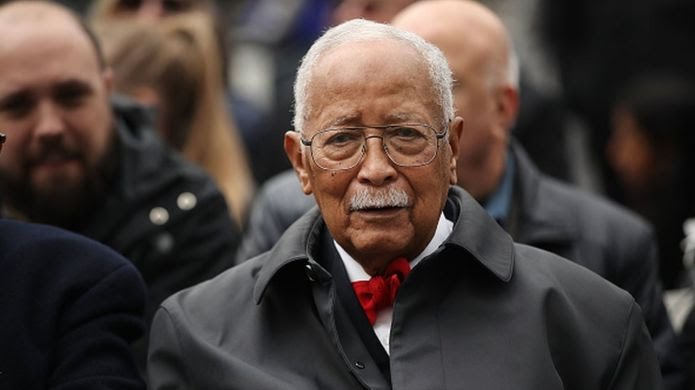David Dinkins, the first New York African-American mayor, has died. He was 93.
The New York City Police Department confirmed that he died on Monday. The department said officers were called to the former mayor’s home in the evening. There are indications that he died of natural causes.
Dinkins’ death happened few weeks after the death of his wife, Joyce, who died in October at the age of 89.
David Norman Dinkins was an American politician, lawyer, and author who served as the 106th Mayor of New York City from 1990 to 1993. He was the first and, till date, only African American to hold that office.

Dinkins calm and courtly figure, with a strong liking for tennis and formal wear, was a dramatic shift from both his predecessor, Ed Koch, and his successor, Rudolph Giuliani.
During his inaugural address, he spoke lovingly of New York as a “gorgeous mosaic of race and religious faith, of national origin and sexual orientation, of individuals whose families arrived yesterday and generations ago, coming through Ellis Island or Kennedy Airport or on buses bound for the Port Authority.”
The City Dinkins inherited, had typical issues; AIDS, guns and drugs killed thousands of people each year. Unemployment rose to unimaginable level. Homelessness was rampant. The city faced a $1.5 billion budget deficit.
Dinkins’ low-key approach, was considered as been incompetent. Critics said he was too soft and too slow. The headlines did not help matters; “Dave, Do Something!” screamed one New York Post headline in 1990, Dinkins’ first year in office.
Dinkins did a lot at City Hall. He raised taxes to hire thousands of police officers. He spent billions of dollars resuscitating abandoned housing. His administration got the Walt Disney Corp, to invest in the cleanup of then-seedy Times Square.
In recent years, he’s gotten more credit for those accomplishments; credit that Mayor Bill de Blasio, who worked in Dinkins’ administration, said he should have always had. De Blasio, named Manhattan’s Municipal Building after the former mayor in October 2015.
“The example Mayor David Dinkins set for all of us shines brighter than the most powerful lighthouse imaginable,” said New York Attorney General Letitia James; who herself became the state’s first Black woman elected to statewide office.
“I was honored to have him hold the bible at my inaugurations because I, and others, stand on his shoulders,” she said.
Results from his accomplishments, however, didn’t come fast enough to earn Dinkins a second term.
Born in Trenton, New Jersey, on July 10, 1927, Dinkins moved with his mother to Harlem when his parents divorced; but returned to his hometown to attend high school. There, he learned an early lesson in discrimination; Blacks were not allowed to use the school swimming pool.
During a hitch in the Marine Corps as a young man, a Southern bus driver barred him from boarding a segregated bus because the section for blacks was filled. “…And I was in my country’s uniform!” Dinkins recounted years later.
While attending Howard University, the historically black university in Washington, D.C., Dinkins said he gained admission to segregated movie theaters, by wearing a turban and faking a foreign accent.
Back in New York with a degree in mathematics, Dinkins married his college sweetheart, Joyce Burrows, in 1953. His father-in-law, a power in local Democratic politics, channeled Dinkins into a Harlem political club. Dinkins paid his dues as a Democratic functionary while earning a law degree from Brooklyn Law School, and then went into private practice.
He got elected to the state Assembly in 1965, became the first black president of the city’s Board of Elections in 1972 and went on to serve as Manhattan borough president.
His administration had one early high note: Newly freed Nelson Mandela made New York City his first stop in the U.S. in 1990. Dinkins had been a longtime, outspoken critic of apartheid in South Africa.
During Dinkins’ tenure, the city’s finances were in rough shape because of a recession that cost New York 357,000 private-sector jobs in his first three years in office.
After leaving office, Dinkins was a professor at Columbia University’s School of International and Public Affairs.
Dinkins is survived by his son, David Jr.; and daughter, Donna and two grandchildren.

